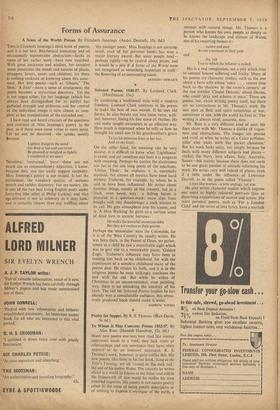Selected Poems, 1940-57. By Leonard Clark. (Hutchinson, 15s.) , IN
combining a traditional style with a modern freedom, Leonard Clark contrives in his poems to make the best of two worlds. If he uses old forms, he also breaks out into loose verse, with- out, however, losing his fine sense of rhythm. He can make simple statements in an effective way. How much is expressed when he tells us how he brought his small son to his grandmother's grave To lay his primrose knot at her feet And on my heart.
On the other hand, his meaning can be very elusive; it is difficult to know what 'Lighthouse' is about, and yet somehow one feels it is pregnant with meaning. Perhaps he carries the elusiveness too far in the one long poem of the selections, Ultima Thule'; he explains it is essentially mystical, but almost all mystics have been lucid writers; Traherne, for example, by whom he is said to have been influenced. He writes about familiar things, mostly of the country, but in a fresh, even novel, way : a fishing heron is postured to a question-mark; snow slips from boughs with tiny thunderings; a cock stutters in its call. He gets atmosphere into his scenes,, and in 'A Man Walking' he gives us a curious sense of dead men in ancient barrows : He walks the peaceful mountain sides
But they are restless in their graves.
Perhaps the 'mountains' were the Cotswolds, for it is of the West Country he mostly writes. He was born there, in the Forest of Dean, we gather, where as a child he saw a remarkable sight which was to give rise to a remarkable poem, 'Golden Eagle.' Traherne's influence may have been in sending him back to his childhood, for with the experiences of a sensitive childhood many of the poems deal. He retains its faith, and it is in the religious poems he most strikingly combines the new with the old. 'But while he writes of Christmas in an unconventional, even puzzling, way, there is no mistaking the sincerity of his faith. The call for Selected Poems implies he has already won a considerable audience; this attrac- tively produced book should make it wider.
ANDREW YOUNG
*


































 Previous page
Previous page